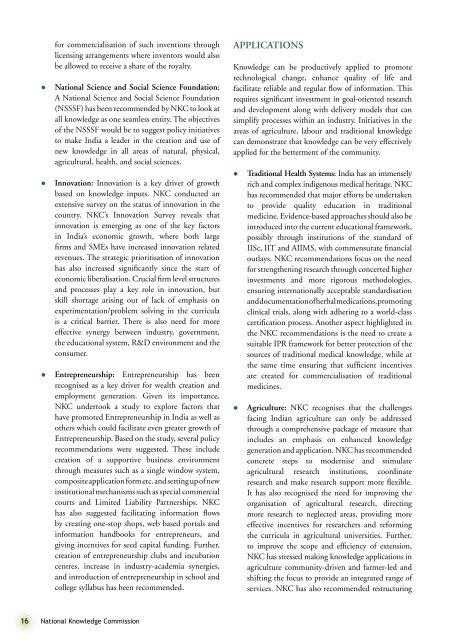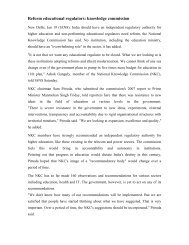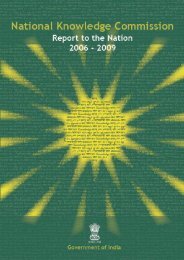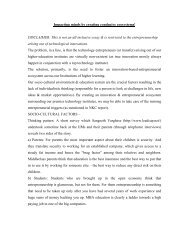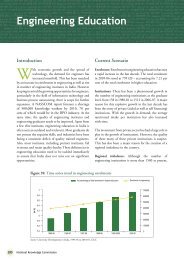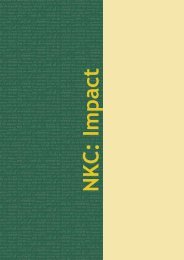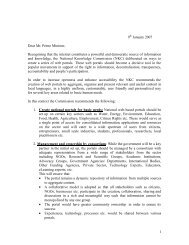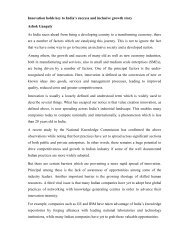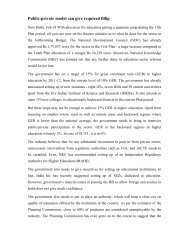National Knowledge Commission Report to the Nation 2009: Overview
National Knowledge Commission Report to the Nation 2009: Overview
National Knowledge Commission Report to the Nation 2009: Overview
Create successful ePaper yourself
Turn your PDF publications into a flip-book with our unique Google optimized e-Paper software.
for commercialisation of such inventions through<br />
licensing arrangements where inven<strong>to</strong>rs would also<br />
be allowed <strong>to</strong> receive a share of <strong>the</strong> royalty.<br />
• <strong><strong>Nation</strong>al</strong> Science and Social Science Foundation:<br />
A <strong><strong>Nation</strong>al</strong> Science and Social Science Foundation<br />
(NSSSF) has been recommended by NKC <strong>to</strong> look at<br />
all knowledge as one seamless entity. The objectives<br />
of <strong>the</strong> NSSSF would be <strong>to</strong> suggest policy initiatives<br />
<strong>to</strong> make India a leader in <strong>the</strong> creation and use of<br />
new knowledge in all areas of natural, physical,<br />
agricultural, health, and social sciences.<br />
• Innovation: Innovation is a key driver of growth<br />
based on knowledge inputs. NKC conducted an<br />
extensive survey on <strong>the</strong> status of innovation in <strong>the</strong><br />
country. NKC’s Innovation Survey reveals that<br />
innovation is emerging as one of <strong>the</strong> key fac<strong>to</strong>rs<br />
in India’s economic growth, where both large<br />
firms and SMEs have increased innovation related<br />
revenues. The strategic prioritisation of innovation<br />
has also increased significantly since <strong>the</strong> start of<br />
economic liberalisation. Crucial firm level structures<br />
and processes play a key role in innovation, but<br />
skill shortage arising out of lack of emphasis on<br />
experimentation/problem solving in <strong>the</strong> curricula<br />
is a critical barrier. There is also need for more<br />
effective synergy between industry, government,<br />
<strong>the</strong> educational system, R&D environment and <strong>the</strong><br />
consumer.<br />
• Entrepreneurship: Entrepreneurship has been<br />
recognised as a key driver for wealth creation and<br />
employment generation. Given its importance,<br />
NKC under<strong>to</strong>ok a study <strong>to</strong> explore fac<strong>to</strong>rs that<br />
have promoted Entrepreneurship in India as well as<br />
o<strong>the</strong>rs which could facilitate even greater growth of<br />
Entrepreneurship. Based on <strong>the</strong> study, several policy<br />
recommendations were suggested. These include<br />
creation of a supportive business environment<br />
through measures such as a single window system,<br />
composite application form etc. and setting up of new<br />
institutional mechanisms such as special commercial<br />
courts and Limited Liability Partnerships. NKC<br />
has also suggested facilitating information flows<br />
by creating one-s<strong>to</strong>p shops, web based portals and<br />
information handbooks for entrepreneurs, and<br />
giving incentives for seed capital funding. Fur<strong>the</strong>r,<br />
creation of entrepreneurship clubs and incubation<br />
centres, increase in industry-academia synergies,<br />
and introduction of entrepreneurship in school and<br />
college syllabus has been recommended.<br />
APPLICATIONS<br />
<strong>Knowledge</strong> can be productively applied <strong>to</strong> promote<br />
technological change, enhance quality of life and<br />
facilitate reliable and regular flow of information. This<br />
requires significant investment in goal-oriented research<br />
and development along with delivery models that can<br />
simplify processes within an industry. Initiatives in <strong>the</strong><br />
areas of agriculture, labour and traditional knowledge<br />
can demonstrate that knowledge can be very effectively<br />
applied for <strong>the</strong> betterment of <strong>the</strong> community.<br />
• Traditional Health Systems: India has an immensely<br />
rich and complex indigenous medical heritage. NKC<br />
has recommended that major efforts be undertaken<br />
<strong>to</strong> provide quality education in traditional<br />
medicine. Evidence-based approaches should also be<br />
introduced in<strong>to</strong> <strong>the</strong> current educational framework,<br />
possibly through institutions of <strong>the</strong> standard of<br />
IISc, IIT and AIIMS, with commensurate financial<br />
outlays. NKC recommendations focus on <strong>the</strong> need<br />
for streng<strong>the</strong>ning research through concerted higher<br />
investments and more rigorous methodologies,<br />
ensuring internationally acceptable standardisation<br />
and documentation of herbal medications, promoting<br />
clinical trials, along with adhering <strong>to</strong> a world-class<br />
certification process. Ano<strong>the</strong>r aspect highlighted in<br />
<strong>the</strong> NKC recommendations is <strong>the</strong> need <strong>to</strong> create a<br />
suitable IPR framework for better protection of <strong>the</strong><br />
sources of traditional medical knowledge, while at<br />
<strong>the</strong> same time ensuring that sufficient incentives<br />
are created for commercialisation of traditional<br />
medicines.<br />
• Agriculture: NKC recognises that <strong>the</strong> challenges<br />
facing Indian agriculture can only be addressed<br />
through a comprehensive package of measure that<br />
includes an emphasis on enhanced knowledge<br />
generation and application. NKC has recommended<br />
concrete steps <strong>to</strong> modernise and stimulate<br />
agricultural research institutions, coordinate<br />
research and make research support more flexible.<br />
It has also recognised <strong>the</strong> need for improving <strong>the</strong><br />
organisation of agricultural research, directing<br />
more research <strong>to</strong> neglected areas, providing more<br />
effective incentives for researchers and reforming<br />
<strong>the</strong> curricula in agricultural universities. Fur<strong>the</strong>r,<br />
<strong>to</strong> improve <strong>the</strong> scope and efficiency of extension,<br />
NKC has stressed making knowledge applications in<br />
agriculture community-driven and farmer-led and<br />
shifting <strong>the</strong> focus <strong>to</strong> provide an integrated range of<br />
services. NKC has also recommended restructuring<br />
16 <strong><strong>Nation</strong>al</strong> <strong>Knowledge</strong> <strong>Commission</strong>


